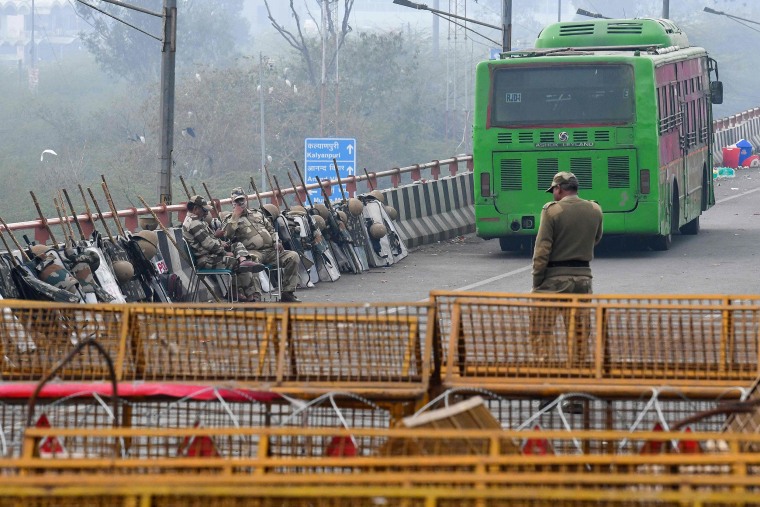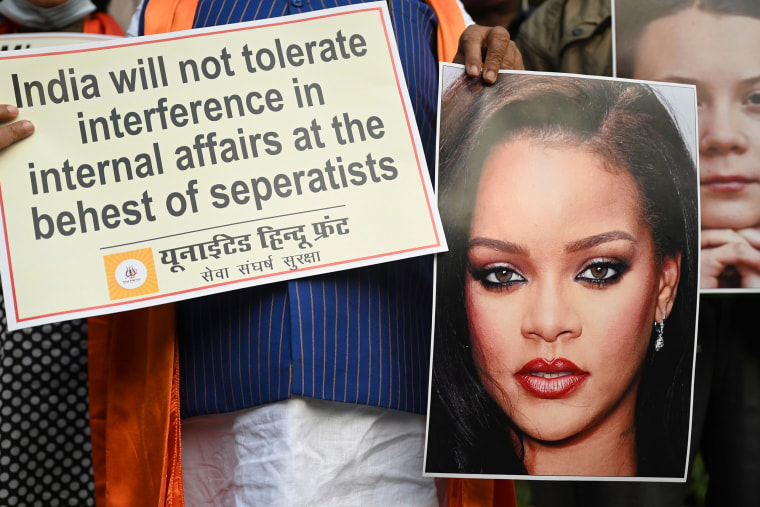Faced with a growing domestic crisis, the Indian government and its supporters appear to have settled on an unlikely target for their ire: international celebrities.
Pop star Rihanna led a growing list of high-profile figures from across the world to express their support for the massive farmers’ protests that have rocked the country for months, prompting a furious backlash.
Tens of thousands of farmers have been camping out in the Indian capital New Delhi to protest new agricultural laws they say could destroy their livelihoods and leave them open to exploitation by large corporations.
The singer posted a link to a report on the subject to her more than 100 million followers on Tuesday, asking “Why aren’t we talking about this?!”
Before long many more were.
Several prominent figures subsequently joined Rihanna in expressing support for the protests, including teenage climate activist Greta Thunberg, Vice President Kamala Harris’ niece, Meena, Rep. Ilhan Omar, D-Minn., and NFL star JuJu Smith-Schuster.
The Steelers wide receiver said that he had donated $10,000 to provide medical assistance to the farmers.
India’s foreign ministry on Wednesday condemned “vested interest groups trying to enforce their agenda on these protests, and derail them.”
The statement didn’t name anyone specifically but added that “the temptation of sensationalist social media hashtags and comments, especially when resorted to by celebrities and others, is neither accurate nor responsible.”
Delhi police, meanwhile, said Thursday that they had opened a case file against the creators of an online toolkit Thunberg had shared with her followers in case they wanted to help those on the ground.
High-profile Modi supporters also rushed to denounce the intervention from international figures.
Bollywood celebrities and national sports stars, who had remained largely quiet about the protests, criticized the “external forces” in posts that used official hashtags promoted by the foreign ministry.
“Indians know India and should decide for India. Let's remain united as a nation,” cricket icon Sachin Tendulkar said on Wednesday.
The reforms enacted in September loosened rules around the sale, pricing and storage of farm produce that have protected farmers from an unfettered free market for decades.
Prime Minister Narendra Modi’s government has failed to quell the largely peaceful demonstrations, and negotiations between the two sides have been unsuccessful.
The protests are posing a rare and major challenge to Modi, who took office in 2014 and has framed the laws as necessary to modernize the country's farming.
Farmers are the most influential voting bloc in India and a key part of its economy.

Clashes between protesters and the police turned violent on January 26, India’s Republic Day holiday, when a group of farmers veered from the protest route and stormed the capital’s historic Red Fort, leaving hundreds injured.
Since then, authorities have increased security at various protest sites, installing steel barricades to stop protesters from entering the capital. The government had also restricted access to mobile internet at some protest sites up until Tuesday evening.
The U.S. state department said in a statement to NBC News Thursday that "We encourage that any differences between the parties be resolved through dialogue. In general, the United States welcomes steps that would improve the efficiency of India's markets and attract greater private sector investment."
"We recognize that unhindered access to information, including the internet, is fundamental to the freedom of expression and a hallmark of a thriving democracy," the spokesperson added.
Organizers have condemned the violence but refused to call off the protest.
Last month, India’s Supreme Court ordered an indefinite pause on implementation of the laws. However, farm unions continue to demand a complete repeal of the legislation.
The leader of India's main opposition Congress party, Shashi Tharoor, said the damage done to the country’s global image by the “undemocratic behavior” of its government could not be restored by asking celebrities to tweet.
Tharoor said that the government getting “Indian celebrities to react to Western ones is embarrassing."
